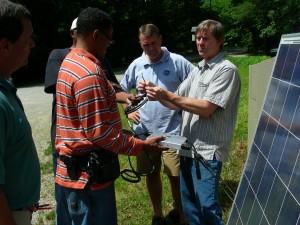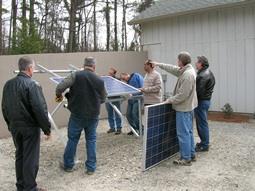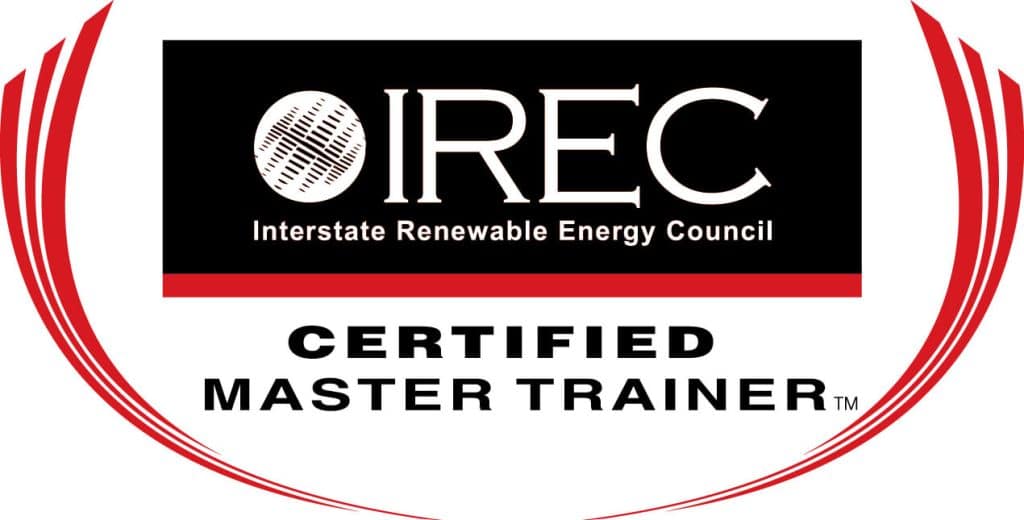
Solairgen’s Kelly Provence: Multi-credentialed installer/trainer talks with IREC’s ISPQ about the value of credentials
By Jane Pulaski
September 15, 2011
What do you say about someone who was the first PV trainer in the U.S. to hold four credentials (IREC ISPQ Master PV and three NABCEP certifications)? An overachiever? Staying ahead of the competition? Hip to the importance of credentials to maintain integrity in the solar profession? All of the above?
Achieving any one of these credentials is an ambitious goal, but four? I wanted to know what (or who) is behind Kelly’s drive to be multi-credentialed. Here’s our conversation.
IREC: Kelly, I’m going to get right to it: what inspired you to attain so many credentials?
KP: I was at a dealer conference at the Florida Solar Energy Center in 2003, when I became aware of NABCEP and the importance of certification. It became apparent to me that in order for the solar industry to maintain a high level of installation integrity, there needed to be a national standard to measure professionalism; NABCEP was doing that with their certification program. In 2006 I earned the PV Installer Certification and in 2007 earned the Solar Thermal Certification; these credentials demonstrated my experience and commitment to my customers, as well as support for a national standard.
IREC: NABCEP awarded its first PV certificants in November 2003. So if you were hearing about it then, you were tuned in to the value of credentials at the very beginning. The NABCEP credential must have resonated with you.
KP: It did. I knew that this industry needed to maintain high standards to succeed and time has proven this to be true. At Georgia Solar Energy Association meetings and in my own work, I supported NABCEP certification as the industry standard we should, and do, support. I started the Solairgen training program with two goals in mind: to help students enter the market with a high level of competency and guide them toward certification.
IREC: Before you discovered NABCEP, what kept you busy? Was solar part of your life then?
KP: Before Solairgen, I owned and operated an electrical contracting company, Provence Electric, from 1995 to 2008. Solar installations were always a part of the business model. In 2002, Solairgen was formed at which time PV and Solar Thermal design and installations became my single focus. I later became involved with the development of Georgia Solar Energy Association (GSEA.) It was while serving as an officer with GSEA that I saw the need for solar training in Georgia. It was then I moved from design and installation and shifted focus solely to PV and ST training.
IREC: Since you recognized the value of an installation credential, when did you recognize the value of the IREC ISPQ credential?
KP: Soon after I designed and implemented our training program, I realized that IREC ISPQ accreditation and trainer certification is just as important to the training sector as NABCEP is to the installation sector of the solar industry. Having the IREC ISPQ credential allows a potential student to make a better decision when selecting a training course – it assures them of the quality of the program they’ve selected – and provides the national training standard they want and need. Moreover, the entire solar industry benefits by having a high national standard of quality and professionalism. We all win.
IREC: Most definitely. I’m curious…what was the order in which you went for the IREC ISPQ credential? Was it program accreditation first, then trainer certification, or was it trainer certification first, then program accreditation?
KP: Program certification came first. The value of accreditation was most important to the company, which of course was important to me. I had several years of installation experience in PV and ST to draw from in teaching, and two NABCEP certifications, but the class syllabus itself needed the “Gold Seal.” After that, Master PV Trainer certification became my goal. Solairgen offers both an accredited class, and a certified instructor. That assures potential students that Solairgen has met the highest quality standards for installation and design training, and keeps us competitive.
IREC: Having an accredited program and certified instructor does ensure the highest quality teaching/learning experience possible. I’m wondering what kind of students you’re seeing in your classroom. Is it a wide range of skills and experience?
KP: The students’ varying backgrounds keep my job interesting and challenging. We offer different classes and each one has its own dynamic. The 40-hour entry level class is usually full each month and consists of electricians, electrical engineers, builders, finance and marketing professionals, with motivated entrepreneurs from unrelated fields. My students are always interesting, and it’s enjoyable to see the high-level of enthusiasm they all show with the opportunity to enter this field. I’m always impressed by the commitment and hard work the candidates in my NABCEP Exam Prep classes demonstrate to become nationally recognized and proficient in the industry. About half of the exam prep students are electricians, some are engineers with the balance being solar contractors and integrators. Many started out taking my PV-203 class. There’s a lot of combined experience in the classroom. It isn’t uncommon for me to learn something from them in the course of a class.
IREC: With such a wide range of skills and experience, it must be a continuous challenge to make sure everyone’s needs and expectations are being met. How do you tackle that?
KP: My first priority is to teach the design and installation of PV equipment and systems with a high level of competency. Everyone comes into my class with strengths and weaknesses, and it’s important that I “level the information field” as soon as possible by bringing all the students to a common level of understanding. This is something I enjoy and do well. It’s rewarding to see so many of my PV-203 students pass the NABCEP Entry Level Exam and then see them go on to rewarding careers in the field – then NABCEP Certification. After each of my exam prep classes and the NABCEP certification exam, I start checking the NABCEP site regularly for new certification awardees. I get a tremendous sense of pride when I see my students who have come through Solairgen classes earn NABCEP certification. Another challenge I face with my students is to stay current with technology and the industry in general, revising my classes as I do. Students are more informed and sophisticated than ever, so I consistently “re-educate” myself so that I deliver up-to-date industry and technological information to my students. If I’m informed, so are they.

IREC: That’s the sign of an exemplary teacher, and students know one when they find one. Not surprisingly, the converse is also true. So in your experience, and if you can narrow it down, what would you say is your biggest success…or successes?
KP: Without Solairgen’s credentials, we would have a hard time competing in an increasingly competitive solar training industry. Bringing my wife, Leigh, into the company is one of my successes. She was instrumental in getting our PV-203 class IREC/ISPQ accredited, and subsequently my IREC/ISPQ Affiliated Master PV Trainer Certification. Having Leigh focus on the marketing and administrative demands of a growing company allowed me the opportunity to put all of my energy into designing classes and teaching. She also encouraged me to get the NABCEP PV Technical Sales certification in their inaugural round of testing. I was the first PV trainer in the U.S. to hold all four credentials: IREC ISPQ Master PV Trainer, with three NABCEP certifications. Of course other top trainers in the industry were right behind me and earned the same credentials, but it was nice to be the first and only, even if it was only for a short time.
IREC: Oh…now I understand who’s the boss. Sounds like a great team. Does Leigh have other certifications in mind for you?
KP: I actually had her believing I was the boss during the first month we started working together. We may have other programs developing so I’m sure I’ll get a nudge in that direction when the time comes. But for now I intend to pursue advanced OSHA training certification, and would also like to become involved in code development. But if I can find the time, which is a luxury, I’ll go back to college to study physics and chemistry. There are many areas of energy conversion that are yet to be discovered and developed.
IREC: Physics and chemistry? I’m so glad there are people like you. I’m a recovering English major, so if you ever need any help spelling ‘physics’ or ‘chemistry,’ or with diagramming sentences, I’m your go-to. I know you’re always looking ahead…what do you see in the queue?
KP: Gaining momentum for Solairgen’s advanced class to teach PV system designers and installers how to analyze system performance is in the immediate queue. I believe this is critical information installers and designers need for their increasingly knowledgeable customers who have expectations of return on investment. Getting this training out to everyone who could benefit is the challenge we are working on now. Long-range goals may involve helping technical colleges develop and implement their solar programs, both PV and solar thermal. I have had several technical college trainers and professors come though our training prior to implementing solar into their own programs. That’s a training venue we’re eager to develop. We’re also in the early development stages of a program that, if it works out, will enable students to receive installation credits toward qualifying for the NABCEP Installer Certification exam. It isn’t in place yet, and there are many logistics to be worked out, but that’s next on our expansion agenda.
IREC: If past performance is any indication of future results, I’d expect to see this as part of Solairgen’s offerings soon (unless you’ve signed up for physics and chemistry classes). Besides your work, which obviously motivates and energizes you, what inspires you?
KP: Wilderness inspires me. The times I feel I have achieved the most, professionally and personally, is when I hike. The reason I entered into the renewable energy industry was to contribute to a sustainable energy balance, lessening the negative environmental impact of fossil fuels. I am inspired when I think that it is possible. When I’m hiking, I imagine that it is.
IREC: So does Leigh have plans for you to get your hiking certification? Your work and commitment are inspiring, Kelly. Thanks a million for your time.
You can reach Kelly directly at koprovence@solairgen.com, or visit Solairgen’s website at www.solairgen.com for information about training classes.

